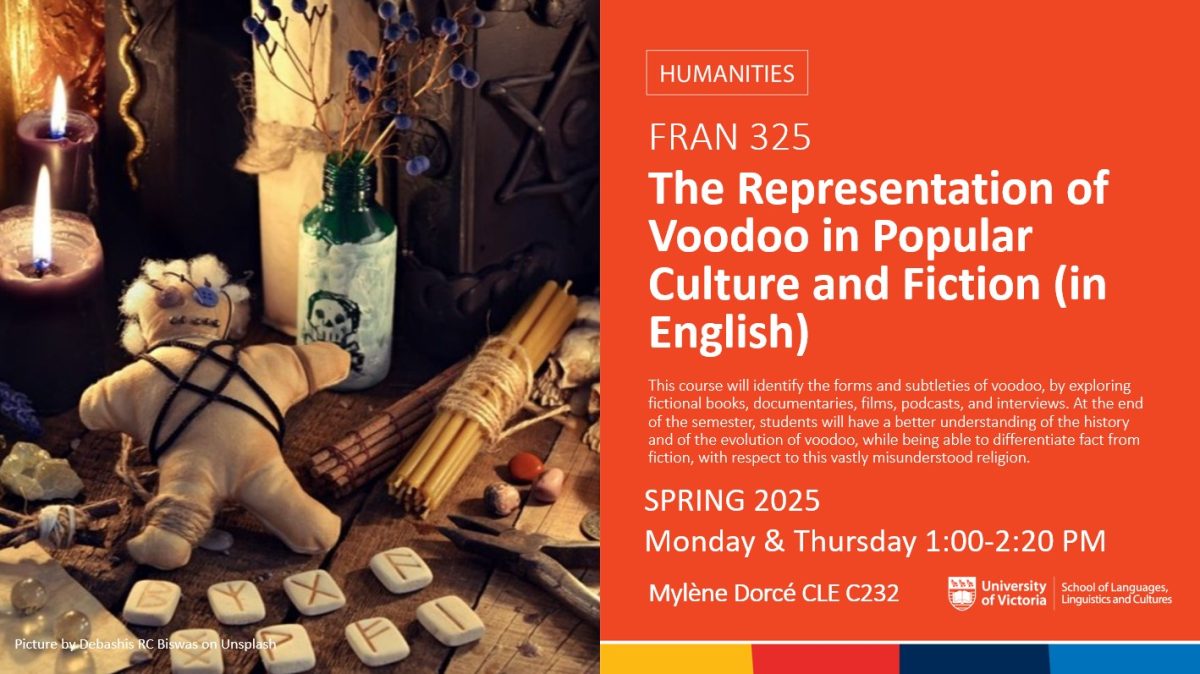An upcoming course will explore voodoo’s true history and practices

Photo courtesy of the University of Victoria.
A new class called The Representations of Voodoo in Popular Culture and Fiction (FRAN 325) is coming to the University of Victoria this 2025 spring semester. The course will be taught by Mylène Dorcé, an assistant professor of Francophone African and Caribbean Studies, who developed the idea in April 2024.
The course will teach students to distinguish facts from fiction by examining the distorted portrayal of Voodoo in a variety of films and books, and making comparisons to the realities of the religion.
According to Dorcé, Voodoo traces back to the seventeenth century, when slave ships from Western Sub-Saharan Africa came to Haiti. Voodooism is a blend of various religious practices including the worshiping of West African Gods and Catholic Saints, and includes a range of ceremonies, rituals and individual practices.
Today, Voodoo is primarily practiced in Haiti, but its dispersion is found in West Africa, Cuba, Brazil, the Dominican Republic, the U.S., and Spain.
“A lot of Haitians may be more ‘Catholic in the day and Voodoo at night,’ but it’s not something you would say [out loud],” said Dorcé. “Everyone thinks Voodoo is something you do when you want to get rid of your enemies by doing black magic rituals,” said Dorcé, noting this is a common misunderstanding. “That’s not Voodoo, that’s something totally separate. If that actually existed in Voodoo, then half the population would disappear.”
Voodoo has been grossly exaggerated and wrongfully portrayed in films, literature, and the media. It’s commonly linked to dangerous dark magic and supernatural phenomena like zombies, witches, and haunted dolls, or framed as a dark or sinister force. These misconceptions can be found in films like The Serpent and the Rainbow and the James Bond movie Live and Let Die, both of which are featured in FRAN 325.
Many people, exposed solely to these misrepresentations, often adopt a distorted or blatantly wrong perception of Voodooism. This perpetuates the ongoing narrative of Voodooism as something to be afraid of.
Mother Bree Ann is a Sancista Voodoo initiate who resides in Victoria, where there is a limited community of Voodoo practitioners. “The element of spookism [is often misunderstood],” she said. Spookism is the belief in the practice of communicating with spirits. “We also know there’s a topic of racism, exoticism, fetishizing and othering. But, Hollywood and the media are sensationalist in general.”
Mother Bree Ann’s lineage is Sanse, a form of Voodoo that originated in Puerto Rico. “We mainly hear about Haitian and New Orleans Voodoo. At first I didn’t know about some of the other lineages, [but there’s many],” she said.
The general lack of acceptance isn’t limited to society, either — it even extends to politics.
“We want to say that our laws are progressive, but they do not support certain traditions,” said Mother Bree Ann. “I was also detained at the border for 12 hours because of travelling with some of my [Voodoo] stuff, [despite it being legal].”
As for portrayals of Voodoo in the media, Mother Bree Ann has seen misused opportunities to showcase the religion. For example, “American Horror Story had a depiction of Voodoo spirits, but used them in a completely wrong way,” she said. “They had an opportunity to do something good there. It felt like it was a purposeful choice to misrepresent.”
Thankfully, not all portrayals are harmful. “We like some of the old movies. [Directors] saw that there was something interesting [in Voodoo].” said Mother Bree Ann. “It can be cheesy, but we have a sense of humour about it. They [often] saw anything African, and called it Voodoo.”
With this upcoming course at UVic, students have an opportunity to learn about the real Voodoo religion, and how it differs from misguided stereotypes.
Dorcé, the course’s professor, has a range of educational and personal insights into Voodoo religion. Dorcé has Haitian roots and family members who follow Voodoo religion but has never practiced it herself. She has lived across the globe, including three years living in Haiti, where she gained first-hand knowledge and experience of the culture. She now resides in Victoria after earning her position as a professor at UVic, and has made valuable contributions to UVic’s School of Language, Linguistics and Cultures.
This course is for “anyone interested in religion or Voodoo, [who] wants to see good movies and read good books.” said Dorcé. The course will take place from Jan. 6, 2025 – April 4, 2025. It will be held on Mondays and Thursdays, from 1 p.m. to 2:20 p.m. in Clearihue Building, Room C214. It has no prerequisites, and is open to all areas of study.






